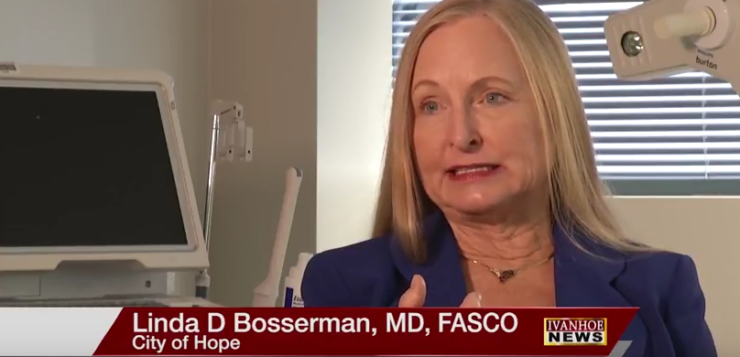Linda D. Bosserman, MD, FASCO, Medical Oncologist and a Clinical Assistant Professor at City of Hope, Fellow of the American Society of Clinical Oncology talks about a drug that may help reduce recurrence of HER2 positive breast cancer.
Tell me a little bit about the NERLYNX trial and how the drug works?
Dr. Bosserman: NERLYNXTM (neratinib) tablets is a very exciting drug that is being used where no other drug has been available/approved to be used before. In women who have HER2-positive (HER2+) breast cancer, which is about one in five women with early stage disease, we treat to cure; however they can still have a significant risk of recurrence even when they finish their treatment which may include surgery, radiation and chemotherapy, as well as a year of the HER2 blocking agent Herceptin® (trastuzmab). The ExteNET trial of extended adjuvant therapy gave women a year of oral treatment with NERLYNX tablets or placebo, after finishing standard trastuzumab-based therapy. They had a remarkable improvement in disease-free survival. At the two year mark, 2.3% less women had a recurrence and it was 2.5% at five years. That means two and a half women for every hundred didn’t have a recurrence and today if you have a recurrence, we don’t have a cure. So we improved, we believe the outcome, but we don’t have overall survival yet.
Without NERLYNX, what would risk of recurrence be?
Dr. Bosserman: Recurrence of women who have HER2+ breast cancer is different depending on your stage and your risk. If you have a very small tumor and no lymph nodes involved, what we call an early Stage 1 cancer, you might have a high 90 percent range of cure rate. But if you have lymph nodes that are positive, if you’re estrogen positive, you had a large tumor, then your recurrence risk could be up at 25-30%. It can be this high even though you’ve finished every proven therapy to date. So, to have a new tool to help lower that risk for those high risk women is really exciting.
What’s it doing?
Dr. Bosserman: So when NERLYNX is used for a year after women with HER2+ breast cancer complete standard trastuzumab-based therapy, it lowers the risk of recurrence by 34%.
For all the women?
Dr. Bosserman: For all women. The absolute benefit, however, will be different depending on your risk. But for higher risk women or women who are concerned, that’s a huge benefit.
How does it work in your body?
Dr. Bosserman: The way NERLYNX works in the body is it gets inside the cancer cells and it blocks part of the HER family of receptors; HER1, HER2, HER4; and often HER2 and HER3 are bound, so if they’re bound together that signaling is interrupted. So you get downstream blocking of signaling and that helps lead to cell death.
Explain for folks who might not understand what HER2 is?
Dr. Bosserman: All of us on chromosome seventeen have a gene called HER2/neu. About one in five women with breast cancer have multiple copies in their cancer cells; those genes make a protein and that protein makes their tumor much more likely to recur, to spread and to be more aggressive and come back earlier. So if we can stop that, that’s the real value of personalized targeted medicine. And NERLYNX gives us another key agent in targeting that HER2 pathway.
And the drug has gotten FDA approval? What does that mean for women?
Dr. Bosserman: To get FDA approval, NERLYNX had to complete their trials. They completed a Phase III study called the ExteNET trial where 2,840 women who had completed their treatment with HER2+ early- stage breast cancer finished their surgery, any chemotherapy, radiation and Herceptin (trastuzmab), half got a year of NERLYNX and half got a placebo. Those that got NERLYNX had a lower risk of recurrence by 34%. All of that data was then submitted to the FDA. The FDA scientists did a very intensive review of the trial, quality of the trial; there was an open panel at the Oncology Drug Advisory Committee (ODAC). ODAC recommended it, and the FDA approved it on July 17, 2017. So it’s now on the market for women with HER2+ breast cancer and doctors to talk about and decide if it’s right for them to add to their treatment plan.
Pretty exciting.
Dr. Bosserman: It gets really exciting to have a tool, the only tool, that’s been approved and shown a benefit in reducing recurrence after you finish standard treatment for early-stage HER2+ breast cancer. And for women with HER2+ breast cancer, that includes a year of Herceptin (trastuzumab).
This seems like a really big breast cancer drug approval, it’s going to be life changing for a lot of women.
Dr. Bosserman: I think it’s a really significant improvement that NERLYNX is now available, because there’s no other drug in this indication (extended adjuvant treatment). Women who finish treatment for HER2+breast cancer with trastuzumab-based therapy and their other therapies that are still important in lowering their recurrence risk, now have an additional drug, that adds another 34% reduction in risk of recurrence and makes it something worth talking to your doctor about.
So let’s talk about recurrence in general.
Dr. Bosserman: Why would somebody want to take another year of a pill that really does need diarrhea management? The reason is if you look at all women with HER2 positive breast cancer, there’s somewhere between a five and 30 percent chance of recurrence. If you have a small Stage 1 cancer it might be a low absolute risk, but for women with multiple nodes positive, estrogen positive, their risk can be up in that thirty percent range. And to lower that 34% is a profound benefit to women.
Let’s talk about Allison. Because her getting this drug is a little bit different. She wasn’t in a trial?
Dr. Bosserman: Because Allison has been public about this I can speak about her case. As a breast cancer specialist, every day I see young women with breast cancer and we ask one question. How do we craft a plan so that when they are done with treatment, they have the lowest chance of this tumor ever coming back? Because our chance to cure it is now, at the beginning. When Allison was under treatment, she had finished her standard surgery, radiation and chemotherapy, and a year of Herceptin (trastuzumab). During the time she was finishing, the ExteNET trial results were presented in 2015. A few months later, I thought, I have two patients who are perfect for this trial. They’re young, they have multiple nodes positive, they’re estrogen receptor positive, which has a little bit higher recurrence risk in that subgroup. So I reached out to the drug company, Puma Biotechnology, Inc., and although the trial was finished and we were within this window period knowing the results were positive, knowing it would take a year or two before we got the FDA approval, the drug company made the drug available under a compassionate use program,. My colleagues at City of Hope and the clinical trial department were willing to work with me and do all the regulatory work to essentially open an individual clinical trial, the compassionate use program, so that Allison had access. We did all the paper work, we had the drug shipped, we did all the diaries with Allison, they dispensed the drug. The drug company provided it free so she was able to get a year of NERLYNX and I’m happy to report, her disease is still in remission. And we hope that’s lifelong.
The only side effect that Allison mentioned was diarrhea?
Dr. Bosserman: Most TKI’s have an array of common on-target side effects. Usually when patients’ bodies have been through chemotherapy and lost their hair, they have profound side effects. The one that we really have to be aware of with NERLYNX is the diarrhea. Experiencing diarrhea is predictable with NERLYNX. However, there’s an aggressive management program. From day one you’re on medicine, high dose loperamide, to stop diarrhea. After six to eight weeks, we evaluate that and we evaluate after two and three months. Allison, after a couple of months, if she didn’t have salad, she had no problem. So every patient will have a different experience. Some have no side effects, some have a lot, every now and then they have to go off the treatment but this is a very predictable side effect and one where we’re very experienced with these oncology drugs. There are other side effects possible but they are ones we commonly manage with other cancer therapies, such as nausea, fatigue, vomiting, etc. In addition, there is a list of medications to avoid when on NERLYNX, as well as grapefruit.
Anything else I haven’t asked you that you think should be included in this story?
Dr. Bosserman: I think the FDA approval is really important. Because although the drug company was really wonderful at making compassionate use available, it’s so much regulatory work that not all my patients who are eligible when they moved out of my practice could get it. One had to move to the Midwest, that cancer center didn’t have the resources and didn’t open the trial. And my 28 year old patient relapsed eight months into when she would have been on the drug. We’ll never know if it would have prevented her recurrence, but women now have the right to talk to their doctors and really find out if NERLYNX is right for them when they finish their year of trastuzmab or Herceptin. I think they each need to make an evaluation whether the side effects, which are manageable, are worth the extra benefit for their situation.
“For additional information on NERLYNX, including the Full Prescribing Information, please visit www.NERLYNX.com to learn more.”
END OF INTERVIEW
This information is intended for additional research purposes only. It is not to be used as a prescription or advice from Ivanhoe Broadcast News, Inc. or any medical professional interviewed. Ivanhoe Broadcast News, Inc. assumes no responsibility for the depth or accuracy of physician statements. Procedures or medicines apply to different people and medical factors; always consult your physician on medical matters.
If you would like more information, please contact:
Linda Bosserman
626-218-2144
Sign up for a free weekly e-mail on Medical Breakthroughs called First to Know by clicking here.




